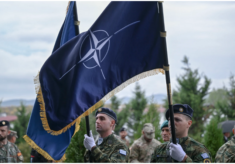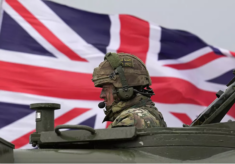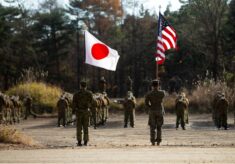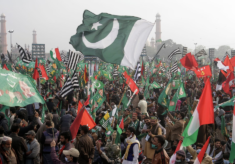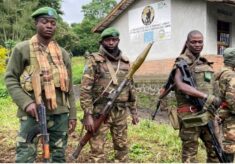Looking at political debates and perceived priorities, it seems that the coming NATO Summit will focus on the Eastern flank.
At the same time, the 11-12 July Summit will give the operative kick-start to the NATO Strategic Direction South (NSD-S) Hub, based in Naples and opened in September 2017.
In 1999, at the NATO Summit in Washington, I remember Italy’s satisfaction when we succeeded to insert a sentence on the Mediterranean in the final statement. From that moment on, things have decisively improved, although Italy has never had the willingness to propose a cooperative program not only for outreach but also for operative involvement vis-à-vis the Arab world.
There is restraint in overtly dealing with military issues and giving a clear mandate to the Atlantic Alliance. As a result, the United States remain the point of reference for NATO’s direction: but as we know, Washington has minimal interest for the Mediterranean, since it is concentrated on the Arabian Peninsula and the Gulf.
First of all, NATO is an alliance among governments to achieve agreed goals. Resources come from the member states and the Atlantic Alliance can only marginally rely on a common budget: this means that “zero-cost” cooperation and voluntary offerings are definitely preferred by NATO members.
Partnerships fall into this framework: they can be relevant if they manage to engage the whole Alliance, political committees and military commands above all. In 2004, the Istanbul Summit approved fundamental documents and, with regard to the Arab partnerships, it represents the brightest date so far.
From 2004 on, cooperation activities with partners started to slowly, but constantly, grow, as well as NATO’s role and visibility in the Arab world. This was also useful to break cultural and psychological barriers among partners, thus improving mutual understanding and building trust.
Then, partnerships have focused on nationally-tailored programs, indicating the willingness to enhance cooperation. We experienced that only practical projects pave the way for political ambitions: there’s room for NATO-Arab partners cooperation in specific areas such as military reform, strengthening of national institutions, learning activities (think to strategic studies) and best practices transfer, with the aim to improve civil-military relations and military systems’ resilience.
Surely, this is a challenging task. NATO’s available resources are not sufficient to fulfil the mission, nor the whole Alliance shares the same degree of commitment with regard to the Arab partnerships: but NATO, as actor, can bring an “add value” to them.
The example to follow is the NATO Defense College, with its Middle East Faculty: established by the Riga, Bucharest and Strasbourg Summits (2006-09), the Faculty gathers civilians and militaries proceeding both from members and partners (Israel among them).
This trajectory led to the creation, in 2017, of the NATO Strategic Direction South Hub, based in Naples in the framework of the Joint Force Command (the former AFSOUTH command for the Mediterranean and the Balkans). On February 2017, NATO’s Defence Ministers decided to found the Hub with a clear political strategy: “NATO looks South”, as wrote the German Marshall Fund in a recent paper.[1] At that time, the Alliance officially joined the Global Coalition against Daesh.
Widely promoted and with a modern headquarter, the new command is extremely complex from an organizational point of view and has a multi-directional mandate that still needs to be defined. “Connect, Consult, Coordinate”: according to official documents, these are the concepts that would inspire the mission of the new structure.
However, things are more complicated. For instance, many of the officers (about a hundred) that the members had to envoy (and pay at a national level) are not available yet and this is why the Hub is not fully operative at the moment (it was planned for January 2018 but it was postponed).
Beyond the Middle East, will the Naples Hub encompass also Sub-Saharan Africa? It will have, as I hope, a special attention for the NATO’s partnerships already existent? These issues remain vague, as the geographical mandate of the Hub: the Alliance’s official narrative lacks in clarity on these points.
Moreover, the Mediterranean Dialogue (MD) and the Istanbul Cooperation Initiative (ICI) are cooperative realities since more than a decade, but they have not been sufficiently enhanced by NATO: before engaging in other projects, this should be the first issue to address.
The Naples Hub would have tasks of observation, monitoring, analysis and networking: this is why many think tanks showed remarkable interest for this institution. These are quite useful and innovative goals, but they can’t be enough in order to build a solid structure able to navigate in a complex environment.
With regard to the chain of command, it starts from the Mons HQ headed by the Supreme Allied Commander Europe (SACEUR): formally, this means the Naples Hub falls under the military structure of NATO. But the “military side” is not sufficient without political guidelines and a defined operative mandate: civil-military coordination is still taking shape and some leading NATO’s governments prefer bilateral relationships with partners, instead of collective ones, to lean on direct networks of leverage.
In this context, Italy has not played a prominent role in giving a direction to Naples Hub so far: this is also related to the unresolved NATO-European Union partnership, that needs to be turned into an effective relationship through practical engagement. For instance, Rome has chosen a “low profile” attitude regarding Libya’s government requests to NATO for cooperation on security projects in the country.
It’s too early to judge the Naples Hub. It has a big potential and, most of all, it can play an innovative, vanguard role in connecting the Atlantic Alliance with neighbourhoods of great strategic interest. Despite all difficulties, this is, fortunately, a road with no way back.
Alessandro Minuto-Rizzo – Former Deputy Secretary General of the NATO and President of the NATO Defense College Foundation
[1] Ian Lesser, Charlotte Brandsma, Laura Basagni. Bruno Lété, “The Future of NATO’s Mediterranean Dialogue. Perspectives, on Security, Strategy and Partnership”, The German Marshall Fund of the United States, June 2018.
*This article originally appeared in Threat and Partners: Framing NATO’s Southern Challenges
https://www.ispionline.it/it/pubblicazione/threats-and-partners-framing-natos-southern-challenges-20932

